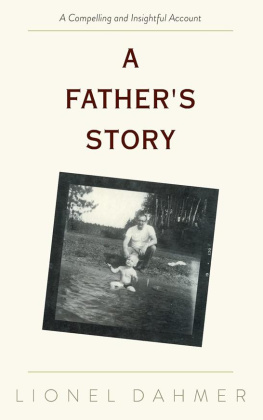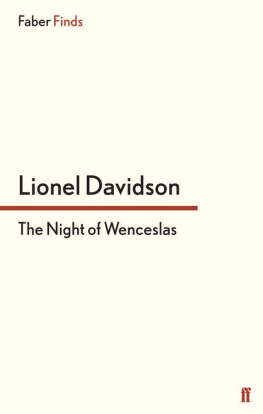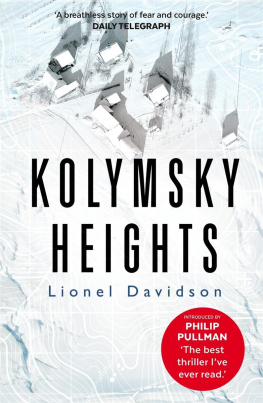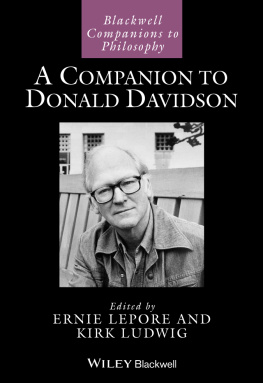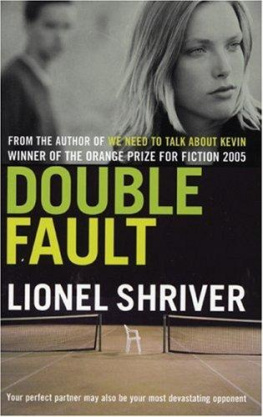Lionel Davidson - Kolymsky Heights
Here you can read online Lionel Davidson - Kolymsky Heights full text of the book (entire story) in english for free. Download pdf and epub, get meaning, cover and reviews about this ebook. year: 2009, publisher: Faber and Faber, genre: Detective and thriller. Description of the work, (preface) as well as reviews are available. Best literature library LitArk.com created for fans of good reading and offers a wide selection of genres:
Romance novel
Science fiction
Adventure
Detective
Science
History
Home and family
Prose
Art
Politics
Computer
Non-fiction
Religion
Business
Children
Humor
Choose a favorite category and find really read worthwhile books. Enjoy immersion in the world of imagination, feel the emotions of the characters or learn something new for yourself, make an fascinating discovery.
- Book:Kolymsky Heights
- Author:
- Publisher:Faber and Faber
- Genre:
- Year:2009
- Rating:4 / 5
- Favourites:Add to favourites
- Your mark:
- 80
- 1
- 2
- 3
- 4
- 5
Kolymsky Heights: summary, description and annotation
We offer to read an annotation, description, summary or preface (depends on what the author of the book "Kolymsky Heights" wrote himself). If you haven't found the necessary information about the book — write in the comments, we will try to find it.
Kolymsky Heights — read online for free the complete book (whole text) full work
Below is the text of the book, divided by pages. System saving the place of the last page read, allows you to conveniently read the book "Kolymsky Heights" online for free, without having to search again every time where you left off. Put a bookmark, and you can go to the page where you finished reading at any time.
Font size:
Interval:
Bookmark:
For Frances
How long, dear friend how long? I await you with eagerness! So much has happened (so much I must not forget) that I use this time to make an account. And to offer a warning. Everything that follows you will find very strange. I urge you to remember our discussions on chance and, above all, to keep two things in mind.
Where, here, you find difficulties, be assured I have shared them. Where you doubt, I too doubted. I did not guess what is here.
I did not guess it. I did not seek it. Chance. But blind chance? You will see. Soon after our last meeting I returned home and took a short holiday with my wife in Pitsunda on the Black Sea. There, there was a motor accident. My wife was killed, I myself badly injured. I spent some weeks in hospital and more in a sanatorium, a victim of severe depression. My friends, my colleagues, all urged a return to work. I returned to work but could not work. My institute was nothing to me, my former interests of no further interest.
This depression was diagnosed as clinical, and I was thereupon transported to a clinic! There I received various treatments, none of avail; and there presently a certain academician began paying me visits.
This academician was only vaguely familiar to me, yet it was soon apparent that he had the liveliest and most knowledgeable interest in my affairs. He had fully consulted my doctors, was aware of my domestic situation; and of course of my publications. In a series of conversations he assured himself that I was still alert in my field. And he made me a proposition.
A research station in the north, he said, needed a new director. Its present head was in a precarious state of health and had not long to live. The work conducted by the station was of the greatest value and a committee had sat for some time considering possible candidates, aided by members of the state organs; from which I deduced that there must be a security aspect to the work. This he confirmed, and went further.
That part of the work that interested the organs would not, he said, meet with approval in all scientific circles this was perfectly understandable and a valid reason for refusal. He had no knowledge of it himself but understood it to be similar to the studies at Fort Detrick in America and Porton Down in England, which is to say the research into materials for chemical and biological warfare.
The next negative aspect was no less important: the appointee to the station would never be able to leave it. For return to normal life had been deemed impermissible. This was not to say it was a life of imprisonment. Far from it. But the factor had to be taken into account with two others: the location of the station and its meteorological conditions (by which I understood that it was in an isolated place with very bad weather).
After this, all the aspects were very positive. Living conditions at the station were not merely good but luxurious. On the professional side, the budget was almost unlimited: at least he had never known the committee refuse any request by the present incumbent. (And since he is safely dead I will name him: L. V. Zhelikov was that incumbent.)
As with the budget, so with the research programme. It was virtually boundless. He talked extensively on this subject, and on his final leaving told me one thing more. All previous appointments to the station had been subject to rigorous vetting. This was principally to determine whether the candidates were psychologically suitable for the life. Many were judged not to be, and even of those selected there had been a percentage of failures. For these unfortunates there was nothing to be done. They could not leave, of course; they had to remain, unhappily for life.
In my case such vetting would not be necessary. But he said I should bear in mind the position of the unfortunates; that he would not be travelling to see me any more; that after thinking the matter over carefully I should simply send him a card saying yes or no. And I said I would do this.
I said I would do it and I sent him the card, saying yes; although in fact I had given it no thought at all. As soon as the words were out of his mouth I had known I would accept. My reasons were simple. My present malaise, I was certain, would not continue. Life resumes, as it always does. I was just as certain that I must now make some definite change in it. And too, there was the isolated place with the very bad weather; Siberia, of course. Of which I will speak later.
For now I say that I sent the card, and six weeks later, very precipitately, with barely time to take leave of my family or say where I was going (for I did not know where I was going) I travelled under escort to the research station.
There I learned the reason for the precipitancy. Zhelikov had days to live. He was riddled with cancer. He sat in his magnificent underground apartment, the apartment I sit in now, in the mobile chair-bed he had designed (his electric chair, he called it) in a state of considerable pain, exhaustion and impatience. He had taken none of his morphine drugs that day in order to keep his brain clear. Almost at once he began giving detailed instructions on how I should deal with a problem that had arisen that very week.
The problem was the collection of a mammoth. Many of the extinct beasts have been found in these parts, of course; the need always being to arrive on the scene before the native hunters, who eat them (and additionally conduct a tidy trade in ivory carvings). Some short time before, the government had prohibited these practices and had made it an offence for a finding not to be reported. This had no effect on the tribesmen, who do not tell on each other, but a significant one on building operations. Among large construction crews there is certain to be gossip, so finds are reported at once and at once followed by standstill orders until properly inspected.
It is not the only significance. Hunters finds have been in caves or other surface locations, the animals having died naturally, with a slow dispersal of body heat and inevitable degeneration of the soft tissue. There was nowhere a complete mammoth, quick frozen so to speak, with its soft tissue intact. What excited Zhelikov now was the probability that he had such an animal within his grasp.
At a sea cape to the north of the research station a site was being prepared for a large installation. During excavation the ground had given way disclosing a crevasse. In the crevasse was a ledge, and on the ledge a mammoth. It was encased in ice. Evidently it had fallen and fallen a long way, to immediate death. A quick-frozen mammoth!
In a fury of impatience, Zhelikov insisted that I go at once to the crevasse. Too sick to travel himself, unwilling to rely on his assistants, he had been awaiting me for four days. For two of these days I had myself been travelling, and was now almost terminally weary. Yet such was his force of character that, not two hours after my arrival, he had driven me out into the cold again; and to a most fateful mission.
At that time of year (it was February) our region has almost twenty-four hours of darkness and a mean temperature of minus fifty degrees. It is also subject to very violent, very localised, gales. We flew into one after half an hour, and although the helicopter was a large and robust machine it was so battered by flying ice that the pilot was forced into an altitude far above visual contact with the ground.
Over the site itself we switched on all our lights and were informed by radio from the ground that they had switched on theirs, but were quite unable to see each other. The pilot cautiously descended, catching a misty glimpse of the lit-up diamond pattern, but felt his rotor blades come under such an onslaught that he rapidly ascended again, asking what he should do.
Font size:
Interval:
Bookmark:
Similar books «Kolymsky Heights»
Look at similar books to Kolymsky Heights. We have selected literature similar in name and meaning in the hope of providing readers with more options to find new, interesting, not yet read works.
Discussion, reviews of the book Kolymsky Heights and just readers' own opinions. Leave your comments, write what you think about the work, its meaning or the main characters. Specify what exactly you liked and what you didn't like, and why you think so.




